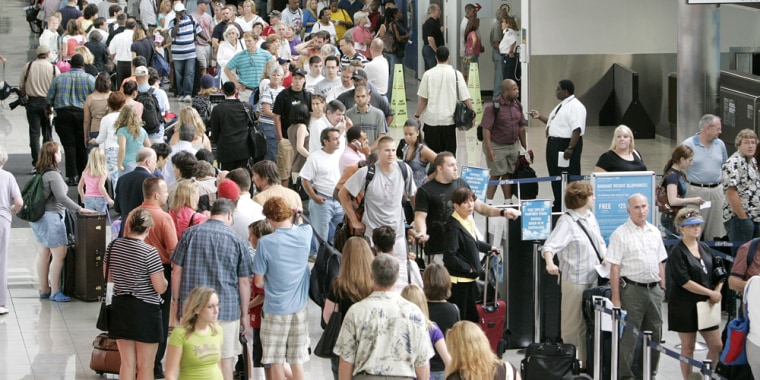Did you hear the news? The government just passed an airline passengers’ bill of rights (PBOR). Among its provisions: If your plane is delayed for four hours, you’re entitled to a meal voucher. If it’s delayed for eight hours, you’re entitled to a voucher for a hotel stay. And if the delay occurs once you’re on board, you have the right to disembark after 90 minutes have gone by.
Too bad you have to be in Canada to take advantage of the plan.
Nevertheless, with similar proposals under discussion last week in Washington, it’s worth looking at what’s going on in Canada and what may be in store this winter — on both sides of the border.
Blasted by blizzards, a plan is born
As with similar efforts in the U.S., the Canadian plan was born out of frustration. In December 2007, a series of powerful blizzards rolled across Eastern Canada, canceling hundreds of flights and stranding thousands of travelers. Among the hardest hit areas was Newfoundland, where would-be fliers found themselves stuck at the St. John’s airport with nowhere to go.
As mayor of the nearby town of Conception Bay South, Woodrow “Woody” French got a firsthand look at the situation when he went to the airport one night. “There were people sitting everywhere, completely dazed, getting no information,” he says. “ It was unconscionable.”
So, as French puts it, he declared himself a “committee of one,” solicited the assistance of various municipal groups and prodded government officials to provide increased protections for stranded travelers.
The result, officially called Flight Rights Canada, was unveiled in Ottawa on September 5. According to Minister of Transport, Infrastructure and Communities Lawrence Cannon, who announced it, the program will “help make sure that air travelers know their rights as consumers, and that obligations of air carriers are reflected in how they provide services.”
The program clearly isn’t a cure-all. Many of the “new” rights simply state the obvious — passengers are entitled to easy access to information regarding their rights — while others reiterate existing regulations that critics contend are routinely ignored. Even more problematic, perhaps, the program explicitly states that nothing in the bill “would make the airline responsible for acts of nature or the actions of third parties,” a clause that essentially lets them off the hook for any number of situations.
“That’s a blizzard-sized loophole for weather,” says Kate Hanni, executive director of the Coalition for an Airline Passengers’ Bill of Rights, who has been lobbying for a PBOR in the U.S. ever since she was stuck on a parked plane in Austin, Texas, for nearly nine hours in December 2006. Still, she’s excited about the new program and believes that including a time limit for tarmac delays could be a game-changer: “The fact that they even mentioned 90 minutes is a huge step forward.”
Just say no to false imprisonment?
Will a similar plan to allow stranded passengers to deplane fly in the U.S.? It all hinges on how the continuing debate over FAA funding eventually plays out.
It breaks down like this: A year ago, the House of Representatives passed an FAA Reauthorization Act, designed in large part to modernize the agency’s aging air traffic control system. The bill included language that requires airlines to provide passengers with food, drinking water and usable bathrooms during delays, along with the right to deplane should a delay become excessive (italics mine).
Meanwhile, the Senate has its own version of the reauthorization bill, which, unfortunately, has been hung up ever since it was proposed. It too included PBOR language, but went even further. Instead of referring to “excessive delays,” the Senate version got specific: After three hours on the ground, you’d have the right — with exceptions, naturally — to say, “Get me off this plane!”
The problem is that, given the situation in the Senate, the reauthorization bill remains stalled, which has forced Congress to fund FAA with a series of three-month extensions, the most recent of which expires on September 30. Another extension is a given — they can’t not fund FAA — and, says Hanni, there was talk last week of a compromise on the language concerning extended tarmac delays that would also permit the inclusion of a passengers’ bill of rights.
This week, that’s looking like a long shot as reports leak out that the latest extension will not include a PBOR. Critics suggest government representatives “caved” in the face of industry pressure and lobbying dollars while Congressional staffers say that the two chambers couldn’t come to terms and will likely pass the extension “clean,” i.e., without revisions.
As a result, any definitive answer on the status of a PBOR in the U.S. will likely have to wait on the resolution of the overall FAA reauthorization bill. In the meantime, fliers would be advised to bring their own food and water, go to the bathroom before they board and be prepared to settle in for another long wait.
